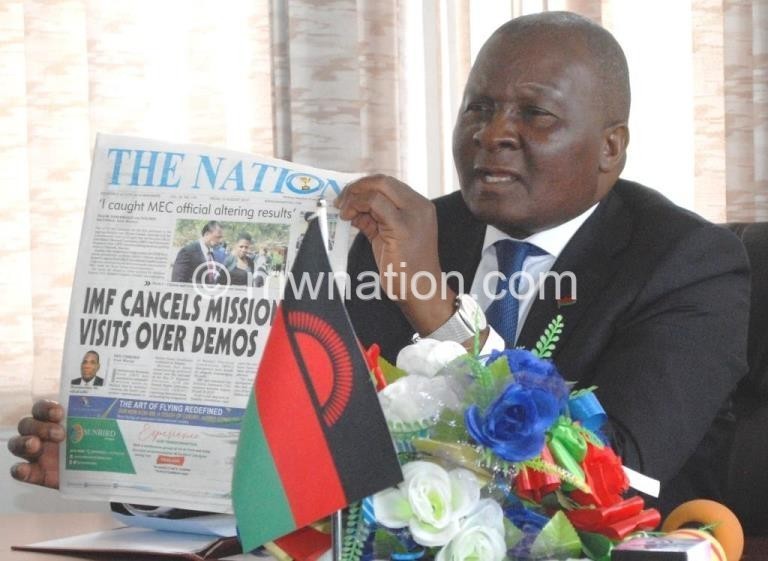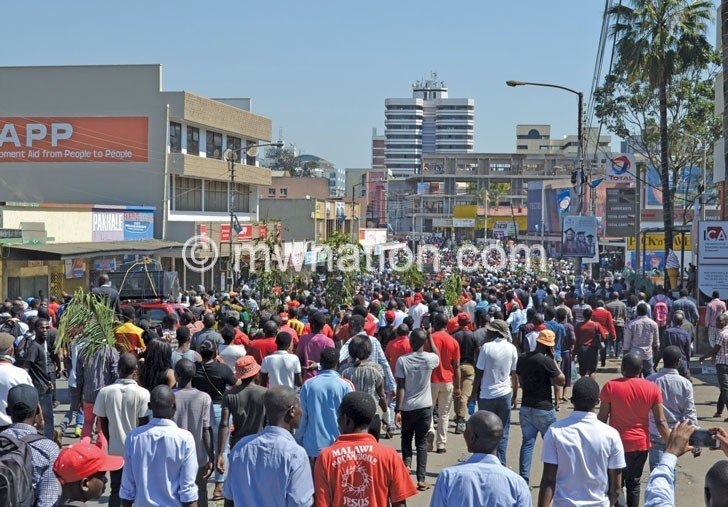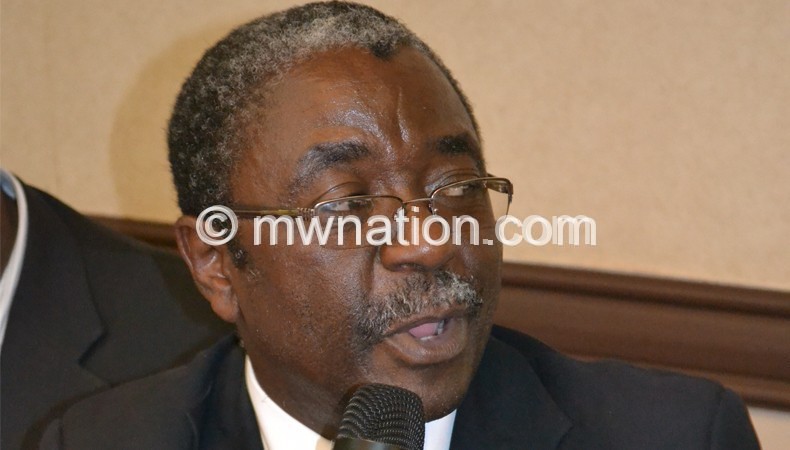Dausi’s demo laws faulted
A heated legal debate has ensued following subsidiary legislations government has gazetted and immediately made them operational, to ban demonstrations in some protected places or areas.
But some legal minds, including Chancellor College-based law professor Edge Kanyongolo and Garton Kamchedzera, argued, in separate interviews on Saturday, that such regulations may only become operational after they are laid before Parliament, citing Section 58—(1) of the Constitution.

Malawi Law Society (MLS) also put its weight in support of those faulting the regulations, arguing it’s a constitutional requirement to have any Executive regulation laid before Parliament.
Government, according to Homeland Security Minister Nicholas Dausi, who announced the gazetted regulations at a news conference in Lilongwe on Thursday, considers airports, borders and other places as protected areas.
Human Rights Defenders Coalition (HRDC), organisers of demonstrations to force Malawi Electoral Commission (MEC) chairperson Jane Ansah resign, targeted airports and borders for their demonstrations which were scheduled for tomorrow before the High Court in Blantyre issued an injunction on Friday against airports and borders shutdown.

Attorney General (AG) Kalekeni Kaphale confirmed, in an interview on Saturday, that the regulations which Dausi announced on Friday became operational immediately.
“You can only lay before Parliament something that is gazetted, right? There are actually two schools of thought. Others think they can become operational after they are laid before Parliament, but for us, those processes would be followed up by the Solicitor General, we consider it the regulations once gazetted, became operational,” Kaphale argued.
But Kanyongolo said the key issue in the matter was whether government laid the subsidiary legislations before Parliament or not.

The Section 58—(1) of the Constitution Kanyongolo referred to reads: “Parliament may, with respect to any particular Act of Parliament, delegate to the Executive or to the Judiciary the power to make subsidiary legislation within the specification and for the purposes laid out in that Act and any subsidiary legislation so made shall be laid before Parliament in accordance with its Standing Orders.”
He emphasised that the Section that follows, 58—(2) was equally important: “Notwithstanding subsection (1), Parliament shall not have the power to delegate any legislative powers which would have substantially and significantly affect the fundamental rights and freedoms recognised by this Constitution.”
Kanyongolo said much as he did not know about case authorities which government may want to use to back its position, he did not find it as a legal, but a factual issue.
“So, the only key question in this debate is: Was this laid before Parliament? That’s what the Constitution demands that such subsidiary legislations must be laid before Parliament before they become operational, simple and straight forward,” he said.
On his part, Kamchedzera described the move as a desperate attempt by government to suppress overwhelming opposition.
“Under the current constitutional order, the law cannot take effect unless it’s brought before Parliament,” said Kamchedzera.
MLS honorary secretary Martha Kaukonde said, in a response to a questionnaire on Saturday, that Executive promulgation of regulations affecting enjoyment of fundamental rights under the Constitution cannot be delegated by Parliament to the Executive arm of government if such regulation substantially and significantly impair the enjoyment of the rights in question.
“MLS would recommend that any party affected by the regulation takes up the matter with the court to determine whether there is significant and substantial impairment of the fundamental rights in issue and whether the regulations have any validity in terms of process of laying down before Parliament,” Kaukonde said.
Former Attorney General, Ralph Kasambara, said in an interview that three High Court judges decided differently on the issue whether subsidiary regulations may become operational immediately they are gazetted or have to be laid before Parliament first.
He said one High Court judge then, now a Malawi Supreme Court of Appeal judge, found in one of the cases that there was no need to have the subsidiary regulations laid before Parliament to become operational.
On the other hand, Kasambara said, two other High Court judges in totally different matters found that the subsidiary regulations may only become operational after they have been laid before Parliament as ministers cannot make laws.
He said if moved, at a later stage, the Supreme Court of Appeal may weigh in on this issue.
The gazetted regulations—dated August 22 2019 as Government Notice No 59 and under the title Preservation of Public Security (Control of Demonstrations Regulations 2019)—stops any person, subject to the Constitution, to hold a demonstration or an assembly in a protected place or protected area.
Government spokesperson, who is also Information and Communications Technology Minister, Mark Botomani, said at the Lilongwe news conference that the regulations have been enforced to maintain some semblance of law and order in the country.
The country has been mired in political unrest over the results of the May 21 Tripartite Election, with HRDC organising protests to force Ansah to step down on accusations that she presided over flawed elections.
On his part, Dausi said: “All airports and land borders will be fully secured by our security agents and, therefore, people should feel free to conduct their normal services.”
Section 3 of the Preservation of Public Security reads: “If, at any time, the minister is satisfied that it is necessary for the preservation of public security so to do, by notice published in the Gazette, declare that the provisions of subsection (2) shall come into operation accordingly…”
So far, various embassies have issued alerts urging their nationals to exercise caution when travelling to Malawi.
A delegation of the International Monetary Fund (IMF), which was due in the country between August 19 and 28 has also called off its trip to Malawi on two technical missions due to then scheduled shutdown protests.
Meanwhile, the High Court in Blantyre on Friday granted an injunction to the Malawi Revenue Authority (MRA), stopping the HRDC from holding demonstrations at airports and border posts. The court said people can demonstrate anywhere, but not in the protected areas.





